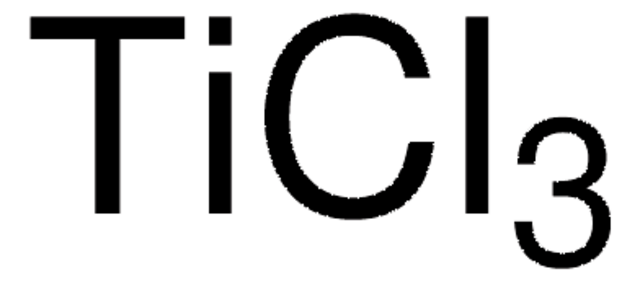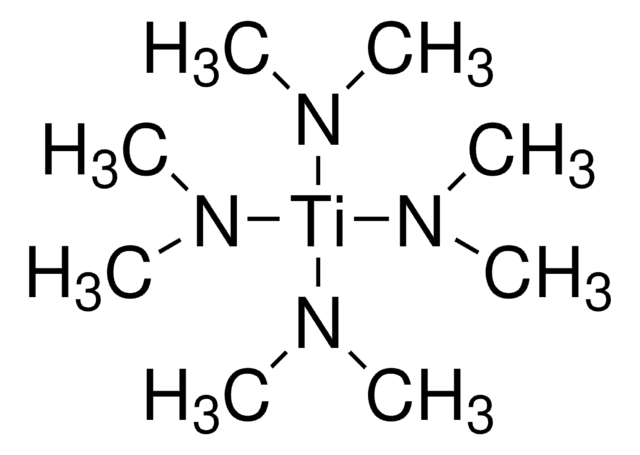697079
Titanium tetrachloride
packaged for use in deposition systems
Synonym(s):
Titanium(IV) chloride, TTC, Titanium tetrachloride
About This Item
Recommended Products
vapor pressure
50 mmHg ( 55 °C)
9.6 mmHg ( 20 °C)
Quality Level
Assay
≥99.995% (trace metals analysis)
form
liquid
reaction suitability
core: titanium
reagent type: catalyst
bp
135-136 °C (lit.)
mp
−25 °C (lit.)
density
1.73 g/mL at 20 °C (lit.)
SMILES string
Cl[Ti](Cl)(Cl)Cl
InChI
1S/4ClH.Ti/h4*1H;/q;;;;+4/p-4
InChI key
XJDNKRIXUMDJCW-UHFFFAOYSA-J
Looking for similar products? Visit Product Comparison Guide
General description
Application
- γ,δ-unsaturated alcohols from allylsilanes and carbonyl compounds,
- N-Phosphinoylimines and N-sulphonylimines from aromatic aldehydes,
- Homoallyl ethers from allylsilanes and acetals.6
Signal Word
Danger
Hazard Statements
Precautionary Statements
Hazard Classifications
Acute Tox. 1 Inhalation - Eye Dam. 1 - Skin Corr. 1B - STOT SE 3
Target Organs
Respiratory system
Supplementary Hazards
Storage Class Code
6.1A - Combustible acute toxic Cat. 1 and 2 / very toxic hazardous materials
WGK
WGK 1
Flash Point(F)
Not applicable
Flash Point(C)
Not applicable
Personal Protective Equipment
Regulatory Listings
Regulatory Listings are mainly provided for chemical products. Only limited information can be provided here for non-chemical products. No entry means none of the components are listed. It is the user’s obligation to ensure the safe and legal use of the product.
JAN Code
697079-BULK:
697079-VAR:
697079-25G:
Choose from one of the most recent versions:
Already Own This Product?
Find documentation for the products that you have recently purchased in the Document Library.
Articles
igma-Aldrich.com presents an article regarding the savannah ALD system - an excellent tool for atomic layer deposition.
Since the demonstration of the first practical solar cell 60 years ago, research on novel materials, improved solar cell design and structure, and innovative manufacturing processes have all contributed to a continuous increase in the efficiency of photovoltaic (PV) devices.
Nanomaterials are considered a route to the innovations required for large-scale implementation of renewable energy technologies in society to make our life sustainable.
The properties of many devices are limited by the intrinsic properties of the materials that compose them.
Global Trade Item Number
| SKU | GTIN |
|---|---|
| 697079-25G | 4061832785899 |
Our team of scientists has experience in all areas of research including Life Science, Material Science, Chemical Synthesis, Chromatography, Analytical and many others.
Contact Technical Service







